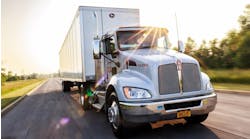A refrigerated straight truck with a natural gas-fueled engine and refrigeration unit provides the city of Louisville, Kentucky, a way to improve the environment and test compressed natural gas (CNG) as an alternative fuel.
For the past year, Louisville has successfully operated a specially equipped Ford truck with a Kidron body. The truck has a Cummins 15B-195 engine modified for natural gas. Truck and refrigeration unit both use natural gas.
"Louisville is a member of the Kentucky Clean Air Coalition and is committed to cleaning up pollution in our city," says Chester Denny, equipment procurement analyst for the city. "We had been looking at natural gas as an alternative fuel, so we applied through the Kentucky Department of Energy for a federal test grant."
In the grant application, Louisville asked for money to test natural gas as the fuel source for both the truck and the refrigeration unit. The grant was awarded, and the city used the money to pay the cost difference between conventional equipment and a vehicle modified for natural gas.
Several Louisville vendors participated in the modification project, including All-State Ford, Dealers Truck Equipment, Cummins Engine, and Bachman NGV, the natural gas system integrator. Thermo King also participated. "CNG has been around for a long time, but using it as an alternative fuel for a refrigeration unit was another matter," Denny says.
At the project's onset in 1996, when Dealers Truck Equipment contacted Thermo King, a natural gas refrigeration unit was not available. A unit was under development, however. Steve Stucky, Thermo King's global director of truck products, assured the other project participants that Thermo King could provide a test unit.
Thermo King developed the MGC 50 Max unit to use natural gas. The MGC 50 Max incorporates features of the diesel-powered MD-II Max, Thermo King says. It is designed with belt-driven dual evaporator fans, aluminum frame, and a microprocessor controller. The unit is charged with R-404A refrigerant.
"The MGC 50 Max has a modified engine for compressed natural gas," Stucky said. "It has microprocessor controls for engine speed and horsepower load."
Thermo King of Indiana Inc installed the MGC 50 Max at its dealership in Jefferson, Indiana, across the Ohio River from Louisville. Tom Lantrip, general manager of the dealership, and Ron Allen, account manager, worked closely with factory engineers and service personnel throughout the three-week process of preparing the truck for natural gas-powered refrigeration.
The truck engine and refrigeration unit draw compressed natural gas from three tanks mounted behind the cab on the outside front wall of the truck body. A sheet-metal box covers the tanks, which weigh about 1,200 pounds. The tanks provide the equivalent fuel of a 33-gallon diesel tank.
"The 10-ft body was set back 24 inches from the back of the cab to accommodate the fuel tanks," said Doug Miller, general manager of Dealers Truck Equipment. "Ordinarily, a truck body is installed three inches back from the cab."
Denny says that he is pleased with the performance of the truck and MGC 50 Max. Louisville will continue to study compressed natural gas as an alternative fuel for several more years, he says, tracking fuel costs and maintenance for both truck and refrigeration unit. "Performance to date shows Louisville has taken a progressive step forward in the race to clean up pollution," he says.


